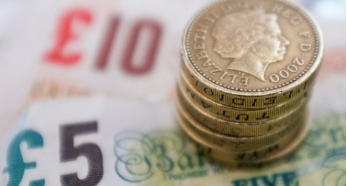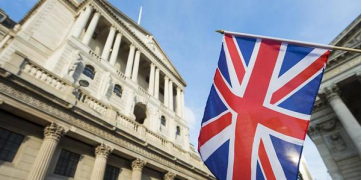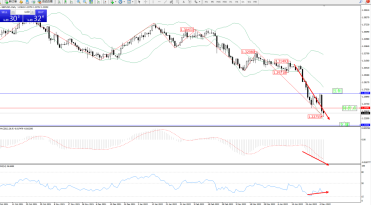GBP/USD tumbled 1.91% to 1.2336 this week, hitting 1.2275 in intraday trading on Friday, the lowest since June 30, 2020. The Bank of England lacks confidence in controlling inflation in the short term, and at the same time, worries about future economic prospects increase, and subsequent inflation Cooling and economic fallout will make the Bank of England cautious. Britain faces the risk of a double whammy of recession and inflation exceeding 10% this year. Bank of England Governor Bailey also expressed a pessimistic view on the prospects for economic recovery, saying that rising prices are starting to limit economic growth and may tip the economy into recession.
The U.S. Commodity Futures Trading Commission CFTC foreign exchange non-commercial position report shows that as of the week of 2022-05-03 (hand) GBP/USD long positions decreased by 6,900 contracts to 33,536 contracts. Sterling fell 0.16% to 1.2336 against the dollar, falling for the third week in a row; the chief economist of the Bank of England said that a complete embargo on Russian energy supplies in Europe will inevitably lead to a higher inflation rate in the United Kingdom, which is heading for the highest level in 40 years. The magnitude increased.
The Bank of England raised interest rates again by 25 basis points to 1%. Since December last year, the Bank of England has raised interest rates four times in a row; so far, UK interest rates have risen to the highest level since 2009. The Bank of England also said it would consider starting to aggressively sell bonds bought under the QE policy, a milestone since it started QE 10 years ago.
Standard Chartered expects the Bank of England to stop raising interest rates by 25 basis points each in June and August to 1.5%, which was previously expected to be raised only in August. We continue to believe that markets are pricing in too aggressive this year (four to five more 25bps hikes by year-end); therefore, while further monetary policy tightening in Q4 cannot be ruled out, we think the BoE will raise rates at Rate hikes are paused at 1.50% to assess new data. The rate is expected to peak at 2.00% next year, so two additional rate hikes are expected in 2023 (up from three previously), most likely in the second and third quarters, but the timing of these additional hikes Very uncertain at this stage.
With the rising cost of living, consumer confidence near record lows, retail sales falling for two straight months, signs of an economic slowdown and even a possible recession intensifying, the Bank of England appears increasingly cautious about tightening money to avoid a recession . It can be seen that the pace and magnitude of interest rate hikes by the Bank of England will never be more aggressive than the Fed in the future, so the disadvantage in interest rate spreads may continue to suppress the rebound performance of the pound. In the early stage, there was an expectation of raising interest rates. Compared with currencies such as the euro, the decline of the pound was limited. In the situation that the interest rate hike may no longer continue when the shoes are on the ground, the pound may continue to fluctuate and decline.
Bank of England chief economist Pill: Hope the UK economy will return to trend growth, albeit weak. At some point, parts of society need to accept that real incomes are shrinking. The UK housing market has shown "resilience". Higher interest rates have a "modest" impact on housing. It is believed that the decline in labor market participation will continue for a considerable period of time.
Bank of England chief economist Pill said: "As the economy weakens, it remains an open question whether people will have to go back to work. Base wage growth could rise to 5% in the coming months and quarters, which is often not aligned with the inflation target. The risk of labor market stress needs to be balanced against a weak demand outlook. We should not overreact to short-term developments or be overly aggressive in policy moves. The Monetary Policy Committee is cautious about commenting too much on market policy rate expectations. We are not driven by developments in financial markets. Market sentiment on interest rates will not drive discussions in the Monetary Policy Committee. The UK's Financial Conduct Authority (FCA) has warned lenders to stop posting misleading credit advertisements.
British Prime Minister Jensen: British and French leaders promised to revive British-French relations, committed to addressing the cost of living, the threat of "dictatorship" countries and global energy security, Britain and France agreed to long-term security and economic support for Ukraine and isolation of Russia British Prime Minister Jensen urged against any negotiations with Russia, whose terms would give credence to the Kremlin's misrepresentation of special military operations, but stressed that it was the Ukrainian government decision. British Prime Minister Jensen and French President Emmanuel Macron also discussed the Northern Ireland deal.
Labour wins majority in 2022 Welsh local council elections
The 2022 Welsh local council elections have ended. In 22 local councils, the Labour Party won 8 local councils, a total of 524 members were elected, and 67 new seats were added; the Welsh Party (PlaidCymru) won 4 local councils and 202 members were elected; the Conservative Party lost its only one in Wales. Control of local councils, where only 111 councillors were elected, losing 86 seats. The Independence Party did not win control of local councils, but it had 314 MPs elected, adding six seats. The other 10 local councils did not have a single party winning a majority.
The daily K-line chart of GBP/USD shows:
The short-term bearish momentum continues to oscillate down in the middle and lower rails of the Bollinger Bands indicator channel. The low level reaches the node near 1.22755 and starts to oscillate. The short-term bearish downward trend is good, and there is no sign of stopping. Suppression focus around 1.26459, low support around 1.21442, focus around the turning point around 1.24091, MACD indicator is at a low level in the bearish area and continues to move downwards, the RSI indicator is at a bearish position, and there are signs of upward movement, as shown in the figure:
[Disclaimer] This article only represents the author's own views, and remains neutral with respect to the statements and opinions in the article, and does not provide any express or implied guarantee for the accuracy, reliability or completeness of the content contained therein, and does not constitute any investment advice. Please read For informational purposes only, and at your own risk and responsibility.
 2022-05-09
2022-05-09
 1511
1511







 简体中文
简体中文
 ภาษาไทย
ภาษาไทย
 繁體中文
繁體中文
 Indonesia
Indonesia











